英语八年级上册Unit1 Where did you go on vacation.说课稿
八年级上册英语:Unit-1-Where-did-you-go-on-vacation试题及答案

Unit 1 Where did you go on vacation?单元测试一、单项选择。
(15分)()1.—________did you go________vacation?—We went to the countryside.A.What,for B.When,on C.Where,on D.Why,an ()2.—________was your summer vacation?—It was great.I went to the park with my friends.()3.—Did you go to Central Park? —________.A.Yes,he is B.Yes,I didC.No,she does D.No,we weren't()4.I'm free today.I have________to do.A.something B.anything C.everything D.nothing()5.Keep ________ down the street and you'll find the shop.A.walks B.walking C.to walk D.walked()6.Everyone here________Huangguoshu Waterfall.A.like B.liking C.to like D.likes()7.There were quite ____ pigs on the farm and they were very cute.A.little B.a little C.a few D.some()8.Boys and girls,you have to plant all the trees______tomorrow.A.myself B.Herself C.themselves D.yourselves()9.Tony is________now,and he wants to eat some food.A.thirsty B.hungry C.tired D.full()10.Oh,what a________lesson!I really get ________with it.A.bored,bored B.boring,boredC.bored,boring D.boring,boring()11.Mary________terrible,so she decided________a doctor.A.felt,to see B.feel,seeingC.feel,to see D.felt,seen()12.I like the food very much.It is ________.A.terrible B.expensive C.delicious D.friendly()13.—Would you like________anything?—No,I don't feel like________anything.A.eating,eating B.eating,to eatC.to eat,eating D.to eat,to eat()14.—Do you like football? —______.I play it every afternoon.A.Of course B.Sorry C.That's OK D.Thanks a lot ()15.—Long time no see!—Oh!it________like years since(自从) I saw you last time.A.looks B.seems C.sounds D.tastes二、阅读理解。
人教版八年级英语上册《Unit-1-Where-did-you-go-on-vacation》教学设计
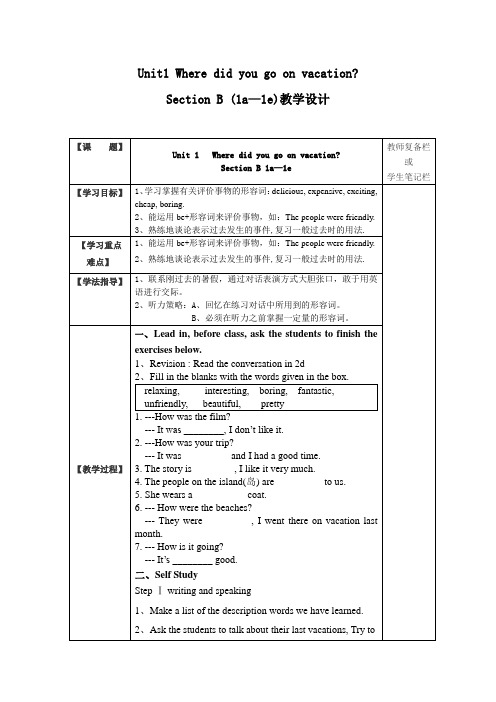
1、First read the questions in 1c and 1d to make clear their meaning.
(Beforelistening, it is necessary to make students know what the task is and what information they should catch from the listening. Also, some writing strategies should be stressed.)
1、Revision : Read the conversation in 2d
2、Fill in the blanks with the words given in the box.
relaxing, interesting, boring, fantastic,
unfriendly, beautiful, pretty
4、Read the listening material following the tape.
三、Group work
Fill in the blanks with interrogatives.
1、A:was the weather?
B:It was sunny.
2、A:did you go on vacation?
A:39
B: They were great, and not expensive.
A: Did you enjoy the food there?
B: Yes, They were great, delicious and cheap.
B
A: What did you do on vacation?
人教版英语八年级上册 Unit 1 Where did you go on vacati

go out 出去
last month 上个月
take photos 拍照
quite a few 相当多;不少
have a good time 玩得开心 go shopping 去购物
of course 当然;自然
seem to do sth. 似乎做某事;好像做某事
keep a diary 写日记
Unit 1 Where did you go on vacation?
单元知识盘点
常用短语
on vacation 度假
go to the mountains 去爬山
stay at home 待在家里 go to the beach 去海滩
summer camp 夏令营
play volleyball 打排球
经典句型
1. ...I bought something for my father. ……我给我爸爸买了一些 东西。
2. Everything tasted really good! 所有的食物尝起来都很美味! 3. How did you like it? 你认为它(三亚)怎么样? 4. It was sunny and hot, so we decided to go to the beach near our
5. |烟台中考|—Look at my new smartphone.
—Wow, it’s so cool. When and where C you
it?
A. do; buy
B. have; bought
C. did; buy
D. have; had
6. —I have seen The Adventures of Alice in Wonderland. What
《八年级英语 Unit 1 Where did you go on vacation》教学设计

《八年级英语Unit1Where did you go on vacation?》教学设计一、教学目标1.掌握本单元的重点词汇和短语,如:go on vacation,stay at home,go tothe beach等。
2.学会运用一般过去时询问和描述过去的活动和经历。
3.提高学生的听说读写综合能力。
二、教学重难点1.重点:一般过去时的用法和本单元的词汇短语。
2.难点:用英语准确描述过去的经历。
三、教学方法情景教学法、任务型教学法、小组合作学习法。
四、教学过程1.导入(1)播放一段关于旅游的视频,引出话题“vacation”。
(2)提问学生:“What did you do on your last vacation?”2.词汇学习(1)展示本单元的词汇图片,教授新词汇。
(2)让学生进行词汇拼写和发音练习。
3.听力训练(1)播放课本听力材料,让学生完成听力任务。
(2)检查答案,讲解听力中的重点内容。
4.对话练习(1)让学生两人一组,根据课本对话范例进行对话练习,询问彼此的假期活动。
(2)邀请几组学生进行对话展示。
5.阅读教学(1)让学生阅读课本中的短文,理解文章内容。
(2)提出问题,让学生回答,检查阅读效果。
6.写作训练(1)让学生写一篇关于自己假期经历的短文。
(2)教师巡视,给予指导。
(3)选取几篇学生的作文进行点评。
7.总结归纳(1)总结本单元的重点词汇和短语。
(2)强调一般过去时的用法。
8.作业布置(1)完成课后练习。
(2)用英语向家人或朋友描述自己的一次假期经历。
人教八年级上册Unit 1 Where did you go on vacation?(必备单词、短语及语法练习)习题 答案

Unit1 Where did you go on vacation?必备单词短语及语法练习Name___________ Grade___________◇Section A重点单词1.anyone 任何人2.anywhere 在任何地方3.wonderful 精彩的;绝妙的4.few 不多;很少5.most 最多;大多数6.something 某事;某物7.nothing 没有什么;没有一件东西8.everyone 每人;人人;所有人9.myself 我自己;我本人10.yourself 你自己;您自己11.hen 母鸡12.pig 猪13.seem 好像;似乎;看来14.bored 厌倦的;烦闷的15.someone 某人16.diary 日记;记事簿◇Section A重点短语1.go on vacation 去度假2.stay at home 待在家3.go to summer camp 参加夏令营4.quite a few 相当多;不少5.of course 当然6.most of the time 大多数时间7.have a good time 玩得愉快8.keep a diary 记日记◇Section B重点单词1.enjoyable 有乐趣的;令人愉快的2.activity 活动3.decide 决定;选定4.try 尝试;设法;努力5.bird 鸟6.bicycle自行车;脚踏车7.building 建筑物;房子8.trader 商人9.wonder 想知道;琢磨10.difference 差别;差异11.top 顶部;表面12.wait 等待;等候13.umbrella 伞;雨伞14.wet 湿的;潮湿的;下雨的15.below 在……下面;到……下面16.enough 足够的(地);充足的(地);充分的(地)17.hungry 饥饿的18.as 像……一样;如同;当……时19.hill 小山;山丘20.duck 鸭21.dislike 不喜爱(的事物);厌恶(的事物)◇Section B重点短语1.feel like 给……的感觉;感受到2.because of 因为3.in the past 在过去4.take the train 乘火车5.get to 到达◇词形变换1.wonderful→(动词)wonder2.activity→(形容词)active3.decide→(名词)decision4.building→(动词)build5.difference→(形容词)different6.wait→(名词)waiter7.you→(反身代词)yourself/yourselves◇重点句型1.Still no one seemed to be bored.似乎仍然没有人觉得无聊。
人教版英语八年级上第一单元Unit1Wheredidyougoonvacation知识点梳理

人教版英语八年级上第一单元Unit1Wheredidyougoonvacation知识点梳理Unit 1 Where did you go on vacation?知识梳理一、词型转换Section A1.wonder →(adj.) wonderful2.I →(反身代词) myself3.you →(反身代词) yourself4.yourself →(pl.) yourselves5.seem →(pt.) seemedSection B1.activity →(pl.) activities2.decide →(n.) decision3.try →(pt.) tried4.bike →(同义词) bicycle5.build →(n.) building6.difference →(adj.) different7.like →(反义词) dislike8.below →(反义词) above二、短语归纳Section A1.go to Central Park 去中央公园2.on vacation 在度假3.buy something special 买特别的东西4.meet someone interesing 遇见有趣的人5.go out with someone 和某人一起出去6.take quite a few photos 拍相当多的照片7.most of the time 大多数时间8.go shopping 去购物9.keep a diary 记日记10.of course 当然;自然Section B1.have a good time 玩得高兴;过得愉快2.go to the beach 去海滩3.feel like 感觉像4.the houses of the Chinese traders 中国商人的房子5. a lot of new buildings 许多新的建筑物6.in the past 在过去7.over an hour 一个多小时8.too many people 太多的人9.get to the top 到达顶部10.because of the bad weather 因为不好的天气11.one bowl of fish 一碗鱼肉12.another two hours 另外两个小时13.the top of the hill 山顶14.learn something important 学习重要的东西Self Check1.go to the countryside 去乡下2.in the shopping center 在购物中心3.have a fun time 玩得高兴;过得愉快4.after three hours 三个小时以后5.keep going 一直走6.twenty minutes later 20分钟后重点句子1.Where did you go on vacation?你去哪儿度假的?2.Long time no see.好久不见。
人教版英语八年级上册UNIT1:Where-did-you-go-on-vacation教学设计

Where did you go on vacation?教学设计(Period1)一、教学目标在本节课结束时,学生将能够:学习本单元的重点短语;用一般过去时就假期活动进行问答;能够口头介绍自己假期的旅游经历等。
知识与能力:通过本课学习,学会使用目标语言进行询问并描述假期活动。
同时在描述自己国内假期活动中学会爱国。
过程与方法:采用二人对话、头脑风暴、小组活动、听力活动和预测听力内容的学习策略,PPT、图片或制作课件等来展开课堂教学、二人对话、小组活动、口头作文等进行谈论假期的经历” 的课堂教学和练习。
利用视频、“询问和本单元的教学法建议:短语教学采取情景引入展开启发式的教学方式,让学生在思考中输出自己的语言,并在句型中学会运用;语音教学让学生进行听对话并跟读听力内容,并在模仿中内化语言,输出语言;口语教学采取pair work 、 report 和口头作文对学生进行教学;听力教学采取听音填表和听音打钩等的方式进行教学,训练学生的听力能力;口头作文教学通过图片启发学生就自己的假期经历进行简单输出;语法教学让学生模仿给出的过去时句子进行模仿,并教师及时纠正。
情感态度与价值观:通过参与课题教学活动,增进同学之间的了解和友情并学会在英语交流中注意他人的情感,同时通过谈论祖国的风景名胜而增强爱国情感。
二、教学重难点教学重点:学生学习并掌握一般过去时的疑问句及答语。
教学难点:帮助学生建立使用助动词did 提问的意识及对谓语动词原形的使用。
三、教学策略语音教学让学生跟读听力材料进行模仿式操练;短语教学采取视频引入话题然后进行启发式教学,并在对话中运用;口语教学采取 pair work 问答式的口语交际活动或小组活动互相操练;听力教学采取听音填表和听音打钩等方式;口头作文教学以对话活动,小组汇报,口头作文等进行口头作文练习;语法教学通过模仿听力材料进行对话练习,在教师的纠正中培养正确的一般过去时语法意识。
四、教学过程Step 1: Lead in通过播放视频引出本节课话题“假期经历”,复习有关假期活动的短语。
初二英语上册(人教新目标)Unit1Wheredidyougoonvacation_知识点总结
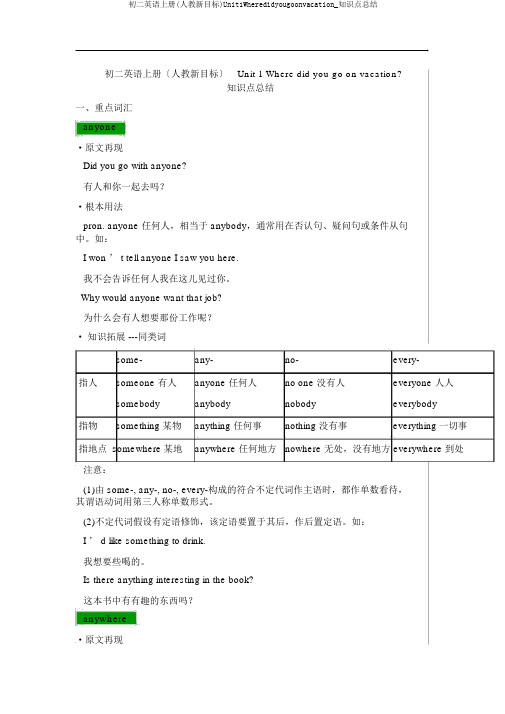
初二英语上册〔人教新目标〕Unit 1 Where did you go on vacation?知识点总结一、重点词汇anyone·原文再现Did you go with anyone?有人和你一起去吗?·根本用法pron. anyone 任何人,相当于 anybody,通常用在否认句、疑问句或条件从句中。
如:I won ’ t tell anyone I saw you here.我不会告诉任何人我在这儿见过你。
Why would anyone want that job?为什么会有人想要那份工作呢?·知识拓展 ---同类词some-any-no-every-指人someone 有人anyone 任何人no one 没有人everyone 人人somebody anybody nobody everybody指物something 某物anything 任何事nothing 没有事everything 一切事指地点 somewhere某地anywhere 任何地方nowhere 无处,没有地方 everywhere 到处注意:(1)由 some-, any-, no-, every-构成的符合不定代词作主语时,都作单数看待,其谓语动词用第三人称单数形式。
(2)不定代词假设有定语修饰,该定语要置于其后,作后置定语。
如:I ’ d like something to drink.我想要些喝的。
Is there anything interesting in the book?这本书中有有趣的东西吗?anywhere·原文再现Oh,did you go anywhere interesting?哦,你去过某个有趣的地方吗?·根本用法adv./pron. anywhere 什么地方,任何地方,常用在否认句或疑问句中。
肯定句中常用 somewhere,其修饰词也常常放在其后面。
人教新目标版英语八上Unit1《Wheredidyougoonvacation》精美说课稿
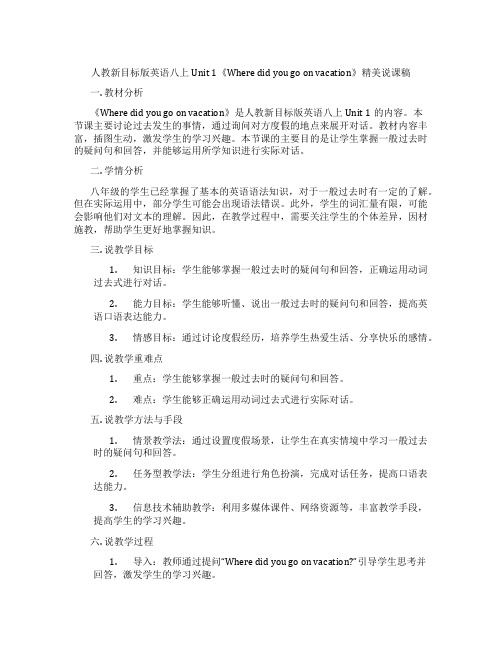
人教新目标版英语八上Unit 1《Where did you go on vacation》精美说课稿一. 教材分析《Where did you go on vacation》是人教新目标版英语八上Unit 1的内容。
本节课主要讨论过去发生的事情,通过询问对方度假的地点来展开对话。
教材内容丰富,插图生动,激发学生的学习兴趣。
本节课的主要目的是让学生掌握一般过去时的疑问句和回答,并能够运用所学知识进行实际对话。
二. 学情分析八年级的学生已经掌握了基本的英语语法知识,对于一般过去时有一定的了解。
但在实际运用中,部分学生可能会出现语法错误。
此外,学生的词汇量有限,可能会影响他们对文本的理解。
因此,在教学过程中,需要关注学生的个体差异,因材施教,帮助学生更好地掌握知识。
三. 说教学目标1.知识目标:学生能够掌握一般过去时的疑问句和回答,正确运用动词过去式进行对话。
2.能力目标:学生能够听懂、说出一般过去时的疑问句和回答,提高英语口语表达能力。
3.情感目标:通过讨论度假经历,培养学生热爱生活、分享快乐的感情。
四. 说教学重难点1.重点:学生能够掌握一般过去时的疑问句和回答。
2.难点:学生能够正确运用动词过去式进行实际对话。
五. 说教学方法与手段1.情景教学法:通过设置度假场景,让学生在真实情境中学习一般过去时的疑问句和回答。
2.任务型教学法:学生分组进行角色扮演,完成对话任务,提高口语表达能力。
3.信息技术辅助教学:利用多媒体课件、网络资源等,丰富教学手段,提高学生的学习兴趣。
六. 说教学过程1.导入:教师通过提问“Where did you go on vacation?”引导学生思考并回答,激发学生的学习兴趣。
2.新课呈现:教师展示教材插图,介绍一般过去时的疑问句和回答。
3.课堂活动:学生分组进行角色扮演,完成对话任务,教师巡回指导。
4.巩固练习:学生进行小组竞赛,看哪个小组能够在最短时间内完成一般过去时的疑问句和回答。
八年级上册英语课文Unit1

Unit 1 Wheredid you go on vacati on?Sectio n A 2dRick : Hi, Helen . Long time no see.Helen: Hi, Rick. Y es, I was on vacati on last month.Rick : Oh, did you go anywhe re intere sting?Helen: Y es, I went to Guizho u with my family.Rick : Wow! Did you see Huangg uoshu W aterfall?Helen: Y es, I did . It was wonderful ! We took quitea few photos there. What about you ? Did you do anythi ng specia l last month?Rick : Not really, I just stayed at home most of the time to read and relax.Linda: Did you do ___ fun on your vacati on, Alice?Alice: Y es, I did. I went to Sanya.Linda: How did you like it ?Alice: Well, it was my first time there, so _____wa s really intere sting.Linda: Did you go with ____ ?Alice: Y es, I did. I went with my sister.Linda: Did you go shoppi ng ?Alice: Of course ! I bought _____for my parent s, but _______ for myself.Linda: Why didn’t you buy ______ for yourse l f ?Alice: I didn’t really see _____I liked.3b anythi ng everythingnothin g everyo ne no oneDear Bill,How was your vacati on ? Did you do _____i ntere sting ? Did ________ in the family go with you ? I went to a friend’s farm in the country side with my family. ________ was great. We fed some hens and saw some baby pigs. They were so cute ! The only proble m was that there was ______muchto do in the evenin g but read. Still ________ seemed to be bored. Bye for now ! MarkSectio n B 2aRead Jane’s diaryentrie s about her vacati on and answer the questi ons.Did Jane have a good time on Monday ? What about on Tuesda y ?Monday, July 15thI arrive d in Penang in Malaysi a this mornin g with my family. It was sunnyand hot , so we decided to go to the beachnear our hotel. My sister and I triedto paragl iding . I felt like I was a bird. It was so exciti ng ! For lunch, we had someth i ng very specia l---Malaysi an yellow noodle s. They were delici ous ! In the aftern oon, we rode bicybl es to George town. Thereare a lot of new bulidings now, but many of the old bulidi ngs are still there. In Weld Quay, a really old placei n Georgetown, we saw the houses of the Chinese traders from 100 yearsago. I wonder what life was like here in the past. I really enjoye d walkin g around the town..Tuesda y, July 16thWhat a difference a day makes! My father and I decide d to go to Penang Hill today. We wanted to walk up to the top ,but then it starte d rainin g a little so we decide d to take the train. We wai ted over an hour for the trainbecause therewere too many people. When we got to the top, it was rainin g really hard. We didn’t have any umbrel la so we were wet and cold. It was terrib l e ! And because of the bad weathe r , we couldn’t see anythi ng below. My father didn’t bringenough money, so we only had one bowl of rice and some fish. The food tasted great because I was so hungry !。
人教版八年级上册英语Unit1 Where did you go on vacation知识点

Unit 1 Where did you go on vacation ? Section A1. Where did you go on vacation ? 你去哪儿度假了?2. vacation= holiday go on vacation去度假on vacation 在度假take a vacation 休假winter vacation 寒假summer vacation 暑假3.go to the mountains去爬山4.stay at home 待在家里5.go to the beach去海滩6.visit sb. /sp. 拜访某人/参观某地visit my uncle/ museums拜访我的叔叔/参观博物馆7.go to summer camp去夏令营8.go to New York City去纽约城9.buy sth for ab./ buy sb. sth 为某人买某物10.something special 一些特别的东西(形容词放在不定代词之后)11. Kevin meet anyone interesting? 凯文遇到有趣的人了吗?【注】不定代词作主语,谓语动词用单数Is everyone here ?12. I have something important to tell you.我有重要的事告诉你。
13.study for tests 为考试而学习14.Did you go with anyone?你和别人一起去的吗?15.Long time no see.好久不见16. quite a few 相当的;不少(修饰可数名词复数)17.take photos 拍照18.take quite a few photos 拍相当多的照片19. Did you go anywhere interesting?你去什么有趣的地方了吗?20.go out 出去21.most of the time大部分的时间22.taste + adj. 尝起来……taste good 尝起来很好23.enjoy oneself=have fun =have a good time玩得高兴反身代词的常见搭配:teach oneself=learn …by oneself 自学by oneself =on ones own=alone 独自help oneself to 随便吃introduce oneself to 自我介绍24. How did you like it ? 你认为它怎么样?How do you like sth?= What do you think of sth? 你认为......怎么样?25.go shopping去购物26.in the countryside 在乡村27.The only problem was that there was nothing much to do in the evening but read.唯一的问题是晚上除了读书没什么事可做。
新人教版八年级英语上册Unit1:Where-did-you-go-on-vacation?知识讲解和练习题
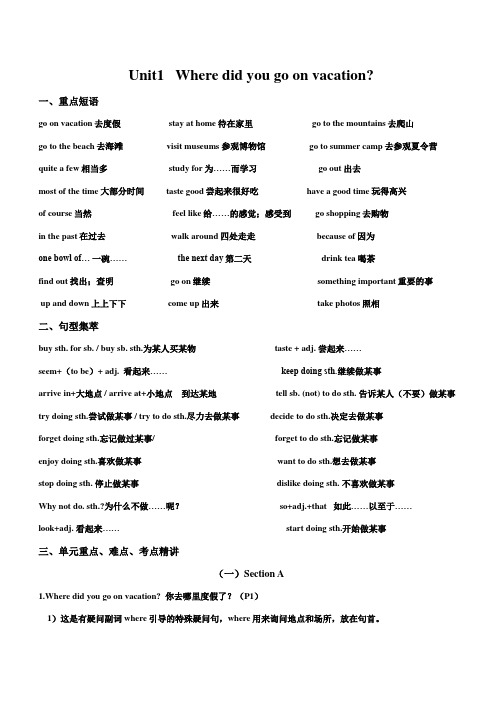
Unit1 Where did you go on vacation?一、重点短语go on vacation去度假 stay at home待在家里 go to the mountains去爬山go to the beach去海滩 visit museums 参观博物馆 go to summer camp去参观夏令营quite a few相当多 study for为……而学习 go out出去most of the time大部分时间 taste good尝起来很好吃 have a good time玩得高兴of course当然 feel like给……的感觉;感受到 go shopping去购物in the past在过去 walk around四处走走 because of因为one bowl of… 一碗…… the next day第二天 drink tea喝茶find out找出;查明 go on继续 something important重要的事up and down上上下下 come up出来 take photos照相二、句型集萃buy sth. for sb. / buy sb. sth.为某人买某物 taste + adj. 尝起来……seem+(to be)+ adj. 看起来…… keep doing sth.继续做某事arrive in+大地点 / arrive at+小地点到达某地 tell sb. (not) to do sth. 告诉某人(不要)做某事try doing sth.尝试做某事 / try to do sth.尽力去做某事 decide to do sth.决定去做某事forget doing sth.忘记做过某事/ forget to do sth.忘记做某事enjoy doing sth.喜欢做某事 want to do sth.想去做某事stop doing sth. 停止做某事 dislike doing sth. 不喜欢做某事Why not do. sth.?为什么不做……呢? so+adj.+that 如此……以至于……look+adj. 看起来…… start doing sth.开始做某事三、单元重点、难点、考点精讲(一)Section A1.Where did you go on vacation? 你去哪里度假了?(P1)1)这是有疑问副词where引导的特殊疑问句,where用来询问地点和场所,放在句首。
部编人教版八年级英语上册《Unit 1Where did you go on vacation【全单元】》精品课件
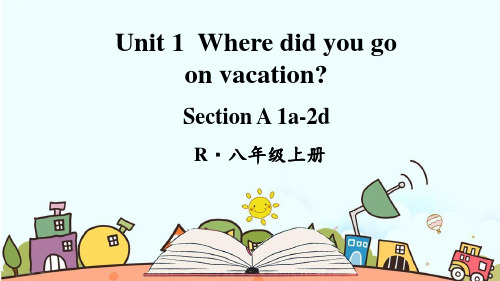
Tapescripts:
ConversLeabharlann tion 1Boy: Where did you go on vacation, Grace?
Grace: I w√ent to New York City.
Boy: Oh, really? Did you go with anyone?
Grace: Yes. I w√ent with my mother.
anything special last month?
Rick: Not really. I just stayed at home most of the “确实没有”
time to read and relax.
Match the people with the right place.
He went to New York City.
Where did he go on vacation?
He went to the beach.
Language points
1. — Where did you go on vacation? — I went to the mountains.
2b Listen again. Check (√) Yes, I did or No, I
didn’t for each question.
Did you…
go with anyone? Grace go to Central Park?
buy anything special?
Yes, I did.
Boy: Oh. So, did you do anything interesting?
Julie: No, I d√idn’t.
新目标八年级上册英语第一单元Unit1 Where did you go on vacation知识点归纳
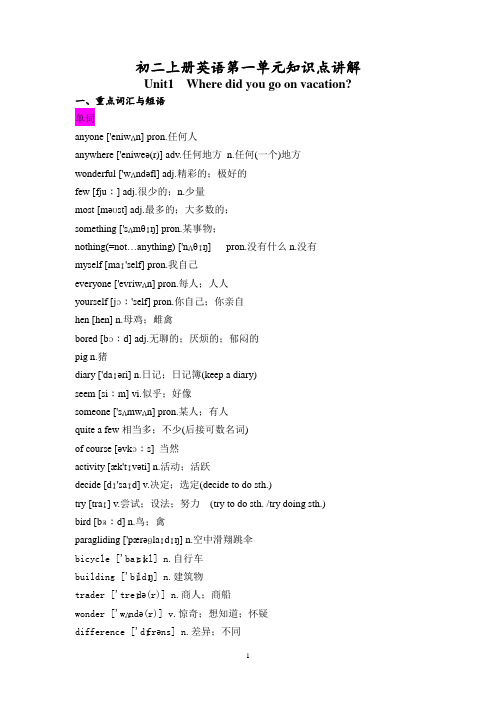
初二上册英语第一单元知识点讲解Unit1 Where did you go on vacation?一、重点词汇与短语单词anyone ['eniwʌn] pron.任何人anywhere ['eniweə(r)] adv.任何地方n.任何(一个)地方wonderful ['wʌndəfl] adj.精彩的;极好的few [fjuː] adj.很少的;n.少量most [məʊst] adj.最多的;大多数的;something ['sʌmθɪŋ] pron.某事物;nothing(=not…anything) ['nʌθɪŋ] pron.没有什么n.没有myself [maɪ'self] pron.我自己everyone ['evriwʌn] pron.每人;人人yourself [jɔː'self] pron.你自己;你亲自hen [hen] n.母鸡;雌禽bored [bɔːd] adj.无聊的;厌烦的;郁闷的pig n.猪diary ['daɪəri] n.日记;日记簿(keep a diary)seem [siːm] vi.似乎;好像someone ['sʌmwʌn] pron.某人;有人quite a few相当多;不少(后接可数名词)of course [əvkɔːs] 当然activity [æk'tɪvəti] n.活动;活跃decide [dɪ'saɪd] v.决定;选定(decide to do sth.)try [traɪ] v.尝试;设法;努力(try to do sth. /try doing sth.)bird [bɜːd] n.鸟;禽paragliding ['pærəɡlaɪdɪŋ] n.空中滑翔跳伞bicycle ['baɪsɪkl] n.自行车building ['bɪldɪŋ] n.建筑物trader ['treɪdə(r)] n.商人;商船wonder ['wʌndə(r)] v.惊奇;想知道;怀疑difference ['dɪfrəns] n.差异;不同top [tɒp] n.顶部;顶wait [weɪt] v.等;等待(wait for)umbrella [ʌm'brelə] n.伞;雨伞wet [wet] adj.湿的;雨天的below [bɪ'ləʊ] prep.低于;在...下面adv.在下面as [əz] conj.如同;像...一样enough [ɪ'nʌf] adj.足够的adv.足够地;充分地duck [dʌk] n.鸭肉;鸭hungry(反full) ['hʌŋɡri] adj.饥饿的;渴望的feel like(doing sth.)想要dislike [dɪs'laɪk] v.不喜欢;厌恶 n.不喜爱;厌恶;反感一、短语:1. go on vacation去度假2.stay at home 待在家里3.go to the mountains 去爬山4. go to the beach 去海滩5. visit museums 参观博物馆6. go to summer camp 去参加夏令营7.quite a few 相当多(只修饰可数名词)8.study for 为……而学习9.go out 出去10.most of the time 大部分时间11. taste good 尝起来很好吃12.have a good time 玩得高兴13. of course 当然14.feel like 给……的感觉;感受到15.go shopping 去购物16.in the past 在过去17. walk around 四处走走18. because of 因为19. one bowl of… 一碗…… 20. the next day 第二天21. drink tea 喝茶22. find out 找出;查明23. go on 继续24.take photos 照相25. something important 重要的事26. up and down 上上下下27. come up 出来28. buy sth. for sb. / buy sb. sth. 为某人买某物29. taste + adj. 尝起来…… 30. look+adj. 看起来……31.nothing…but+动词原形除了……之外什么都没有32.seem+(to be)+ adj. 看起来……33. arrive in+大地点/ arrive at+小地点到达某地34.decide to do sth. 决定去做某事35. try doing sth. 尝试做某事/36. try to do sth. 尽力去做某事37. forget doing sth. 忘记做过某事/38. forget to do sth. 忘记做某事39. enjoy doing sth. 喜欢做某事40. want to do sth. 想去做某事41. start doing sth. 开始做某事42. stop doing sth. 停止做某事43. dislike doing sth.不喜欢做某事44. keep doing sth. 继续做某事45. Why not do. sth.? 为什么不做……呢?46. so+adj.+that+从句如此……以至于……47. tell sb. (not) to do sth. 告诉某人(不要)做某事48 .have a good time=enjoy oneself=have fun(doing sth.)玩得痛快二、句型1、buy sth. for sb. = buy sb. sth.为某人买某物2、taste + adj. 尝起来…… look+adj. 看起来……3、nothing…but+动词原形除了……之外什么都没有4、seem+(to be)+ adj. 看起来……5、arrive in+大地点(如国家、省份、城市等)/ arrive at+小地点(如学校、商店、车站等)到达某地get to+地点/reach+地点到达某地6、decide to do sth.决定去做某事7、try doing sth.尝试做某事(强调抱着试试看的心态尝试某件事是否行得通)/ try to do sth(强调付出努力并设法去完成).尽力去做某事8、forget doing sth.忘记做过某事/ forget to do sth.忘记做某事9、enjoy doing sth.喜欢做某事10、want to do sth.想去做某事want sb to do sth11、start doing sth.开始做某事12、stop doing sth. 停止做某事13、dislike doing sth. 不喜欢做某事14、keep doing sth.继续做某事keep on doing sth 不停做某事15、. Why not do. sth.=Why don’t you do sth? 为什么不做……呢?16、so+adj.+that+从句如此……以至于……17、tell sb. (not) to do sth. 告诉某人(不要)做某事18、enough+名词:足够的;充足的;从分的;形容词+ enough:足够地;充足地;从分地19、not really:真的没有20、seem to do sth 似乎好像做某事21、Bye for now!到这该说再见了!22、.have a good time=enjoy oneself=have fun(doing sth.)玩得痛快keep sth+adj.使…保持…状态feel like +n./v.ing sth 想要……;想要做……三、重点句子1. Where did you go on vacation? 你去哪儿度假的?1)这是一个由疑问副词where引导的特殊疑问句。
八年级上册Unit 1 Where did you go on vacation单元语法知识汇总
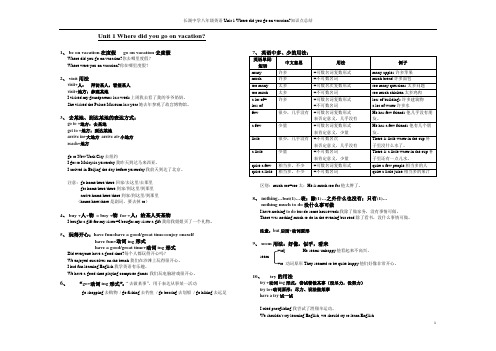
Unit 1 Where did you go on vacation?1、be on vacation在度假go on vacation去度假Where did you go on vacation?你去哪里度假?Where were you on vacation?你在哪里度假?2、visit用法visit+人:拜访某人,看望某人visit+地方:参观某地I visited my grandparents last week.上周我去看了我的爷爷奶奶。
She visited the Palace Museum last year.她去年参观了故宫博物馆。
3、去某地、到达某地的表达方式:go to +地方:去某地get to +地方:到达某地arrive in+大地方arrive at+小地方reach+地方go to New York City去纽约I got to Malaysia yesterday.我昨天到达马来西亚。
I arrived in Beijing the day before yesterday.我前天到达了北京。
注意:go home/here/there回家/去这里/去那里get home/here/there到家/到这里/到那里arrive home/here/there到家/到这里/到那里(home/here/there是副词,要去掉to)4、buy +人+物= buy +物for +人:给某人买某物I bought a gift for my sister.=I bought my sister a gift.我给我姐姐买了一个礼物。
5、玩得开心:have fun=have a good/great time=enjoy oneselfhave fun+动词ing形式have a good/great time+动词ing形式Did everyone have a good time?每个人都玩得开心吗?We enjoyed ourselves on the beach.我们在沙滩上玩得很开心。
- 1、下载文档前请自行甄别文档内容的完整性,平台不提供额外的编辑、内容补充、找答案等附加服务。
- 2、"仅部分预览"的文档,不可在线预览部分如存在完整性等问题,可反馈申请退款(可完整预览的文档不适用该条件!)。
- 3、如文档侵犯您的权益,请联系客服反馈,我们会尽快为您处理(人工客服工作时间:9:00-18:30)。
英语八年级上册Unit1 Where did you go on vacation.说课稿
各位老师大家好,
度假这一话题是学生经过了一个暑假之后很乐意分享的一个话题,
一.说教材
1.教材的地位与作用:Unit1 Where did you go on vacation 这单元通过复习动词过去式和学习一些关于活动的词汇,用Where did you go on vacation谈论暑假活动,与七年级(下)Unit 11 How was your school trip. 学习一般过去式的构成及用法, Unit 12 What did you do last weekend?谈论周末的活动有着密切的联系。
本课要求综合运用过去式和活动,是这单元的第一课和重点课,学好本课将为进一步学习一般将来时打下良好的基础。
2.教学目标:
1、让学生能说,能背,能写这7个表示暑假活动的词组的过去式形式:stayed at home, went to the beach, went to the New York city, visited my uncle, went to summer camp, went to the mountain, visited museums.、
2、让学生两两能用Where did you go on vacation?的句型进行对话询问并回答
教学重、难点:重点是掌握本课等重点词汇,重点句型和一般过去时态的使用。
规则动词和不规则动词的过去式
二. 说教法
1.新课标倡导的“用英语教英语”,尽量用英语教学,创造英语课堂良好的听的环境,让学生充分感知,积极体验,大胆实践,把握用英语交际的机会,鼓励学生大胆开口说英语。
2.突出重点,突破难点:通过听力训练、做活动、小组竞赛等多种形式反复操练重点句型,巩固所学知识,提高灵活运用能力,通过操练中人称的变化和幻灯片展示帮助学生更好地领会语法。
3.任务型教学法:倡导体验参与,培养自主学习能力。
课前布置任务,要求学生复习七年级(下)Unit 11,unit12中的词汇句型,预先读本课新词,让学生带着任务有目的地上课,并在课堂学习中不断获得完成此任务所必须的知识、能力、技能等,为最终完成任务作全面的准备。
4借助多媒体辅助教学,形象、生动,使课堂容量相对增加,给学生提供更多的语言实践机会,有利于综合语言运用能力的提高。
5.教具:电脑多媒体、录音机等。
三.说学法
1. 学会预习:发挥学生的主观能动性,变被动学习为主动学习,带着问题有目的地听课,可以更好地把握课堂的重点和难点,提高课堂效率。
2.合作学习:积极参与2人或4人小组对话或活动,相互交流,互帮互助,合作完成任务,培养团队精神,更好地掌握本课所学知识。
3.“为用而学,用中学,学了就用”:善于抓住用英语交际的机会,充分感知,联系实际,积极体验,大胆实践。
四.说教学过程:
情景可以满足学生的心理需要,引起他们的有意注意因此,上课伊始
教师从实际情况导入问同学暑假到了哪些地方玩?在训练学生听音的同时思考并用英语说出自己的活动
1、学生自学课本P1-2,并标出不认识或者不会读的单词。
2、学生六人小组互相教不认识或不会读的单词。
并轮流在小组内带读各一遍。
3、学生个人完成1a部分后,两两进行答案核对。
这部分内容可以让学生思考,并练习听力和口语。
也是一个课堂小动。
4、教师播放录音带2遍,学生个人完成1b部分,4人小组进行核对答案。
5、学生2人小组进行听力材料的复述。
6、教师挑选5个学生进行展示。
这部分活动专项训练听力,加强对课本内容的熟悉
7、教师播放录音带3遍,学生个人完成听力2a,2b部分,学生5人小组完成答案的核对。
8、学生8人小组进行询问暑假到哪玩的对话训练。
9、教师挑选6组对话进行展示。
是课堂的大动,课标指出,教师要有意识的形成自己的教学策略,在这个环节里学生不但巩固知识也获得交际的机会,把知识和实际结合起来运用。
家庭作业时课堂的延伸
每个同学完成10名同学暑假活动的调查表格,能起到对本课的巩固作用。
五学法指导
通过这节课的教学,教师做到了以下三点,
一,通过训练,让学生模仿正确的语音语调,养成良好的听说习惯
二,交流时,给学生提示,让学生打开思路,训练学生把知识转化为技能,激发学生表现欲望,让其有成功的体验
三,在训练时,提供学生介绍活动的框架,让学生模仿
总之,在本课中教师让学生参与,把本课的教学难点和重点有机结合起来,坚持趣味性和灵活性原则,是学生受到多元信息的熏陶。
不足之处,望各位老师批评指正。
谢谢。
